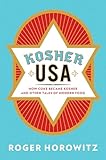Kosher USA : How Coke Became Kosher and Other Tales of Modern Food / Roger Horowitz.
Material type: TextSeries: Arts and Traditions of the Table: Perspectives on Culinary HistoryPublisher: New York, NY : Columbia University Press, [2016]Copyright date: ©2016Description: 1 online resource (320 p.) : 27 b&w illustrationsContent type:
TextSeries: Arts and Traditions of the Table: Perspectives on Culinary HistoryPublisher: New York, NY : Columbia University Press, [2016]Copyright date: ©2016Description: 1 online resource (320 p.) : 27 b&w illustrationsContent type: - 9780231158329
- 9780231540933
- 296.7/30973 23
- BM710 .H675 2016
- BM710 .H675 2016
- online - DeGruyter
- Issued also in print.
| Item type | Current library | Call number | URL | Status | Notes | Barcode | |
|---|---|---|---|---|---|---|---|
 eBook
eBook
|
Biblioteca "Angelicum" Pont. Univ. S.Tommaso d'Aquino Nuvola online | online - DeGruyter (Browse shelf(Opens below)) | Online access | Not for loan (Accesso limitato) | Accesso per gli utenti autorizzati / Access for authorized users | (dgr)9780231540933 |
Browsing Biblioteca "Angelicum" Pont. Univ. S.Tommaso d'Aquino shelves, Shelving location: Nuvola online Close shelf browser (Hides shelf browser)

|

|

|

|

|

|

|
||
| online - DeGruyter Investment: A History / | online - DeGruyter The Autonomy of Pleasure : Libertines, License, and Sexual Revolution / | online - DeGruyter Sacred Knowledge : Psychedelics and Religious Experiences / | online - DeGruyter Kosher USA : How Coke Became Kosher and Other Tales of Modern Food / | online - DeGruyter Industry and Intelligence : Contemporary Art Since 1820 / | online - DeGruyter Culture of Encounters : Sanskrit at the Mughal Court / | online - DeGruyter The Great East Asian War and the Birth of the Korean Nation / |
Frontmatter -- Contents -- Prologue: Uncle Stu's Question -- 1. My Family's Sturgeon -- 2. Kosher Coke, Kosher Science -- 3. The Great Jell-O Controversy -- 4. Who Says It's Kosher ? -- 5. Industrial Kashrus -- 6. Man-O-Manischewitz -- 7. Harry Kassel's Meat -- 8. Shechita -- Conclusion: Kosher Ethics / Ethical Kosher ? -- Epilogue: Remembering, Discovering, Thanking -- Notes -- Index
restricted access online access with authorization star
http://purl.org/coar/access_right/c_16ec
Kosher USA follows the fascinating journey of kosher food through the modern industrial food system. It recounts how iconic products such as Coca-Cola and Jell-O tried to become kosher; the contentious debates among rabbis over the incorporation of modern science into Jewish law; how Manischewitz wine became the first kosher product to win over non-Jewish consumers (principally African Americans); the techniques used by Orthodox rabbinical organizations to embed kosher requirements into food manufacturing; and the difficulties encountered by kosher meat and other kosher foods that fell outside the American culinary consensus. Kosher USA is filled with big personalities, rare archival finds, and surprising influences: the Atlanta rabbi Tobias Geffen, who made Coke kosher; the lay chemist and kosher-certification pioneer Abraham Goldstein; the kosher-meat magnate Harry Kassel; and the animal-rights advocate Temple Grandin, a strong supporter of shechita, or Jewish slaughtering practice. By exploring the complex encounter between ancient religious principles and modern industrial methods, Kosher USA adds a significant chapter to the story of Judaism's interaction with non-Jewish cultures and the history of modern Jewish American life as well as American foodways.
Issued also in print.
Mode of access: Internet via World Wide Web.
In English.
Description based on online resource; title from PDF title page (publisher's Web site, viewed 02. Mrz 2022)


